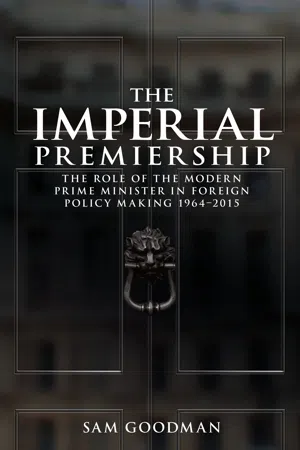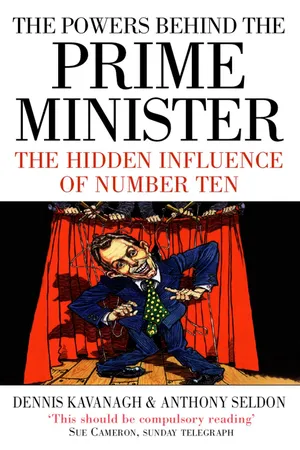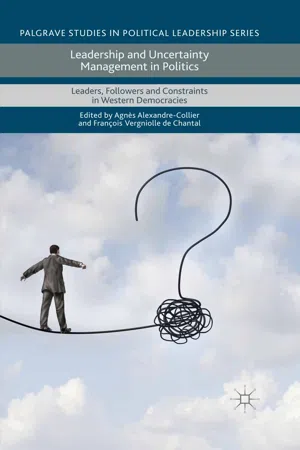History
Edward Heath
Edward Heath was a British politician who served as Prime Minister from 1970 to 1974. He was the leader of the Conservative Party and is best known for taking the United Kingdom into the European Economic Community (EEC) in 1973. Heath's time in office was marked by economic challenges and industrial disputes, and he also played a key role in the Northern Ireland conflict.
Written by Perlego with AI-assistance
Related key terms
4 Key excerpts on "Edward Heath"
- eBook - ePub
The imperial premiership
The role of the modern Prime Minister in foreign policy making, 1964–2015
- Sam Goodman(Author)
- 2016(Publication Date)
- Manchester University Press(Publisher)
2Ted Heath, 1970–74
Edward Heath was an established figure in both the Conservative Party and in government long before he became Prime Minister on 19 July 1970. Under the premierships of Eden, Macmillan and Douglas-Home, he had spent thirteen of the twenty years prior to 1970 in Government rising through the ranks. During this period he had a first-hand apprenticeship in foreign policy.Serving as Chief Whip to Anthony Eden, he witnessed close up the folly and mistakes of the Suez Crisis. He only managed to stay out of the controversy due to the parliamentary convention that Government Whips cannot speak in the House of Commons.Heath played a pinnacle role in the selection of Eden's successor, Harold Macmillan in January 1957. He reported on the opinions of the majority of Conservative backbench MPs, which largely favoured Macmillan. This helped him secure the party leadership's backing. Macmillan never forgot Heath's support and the two became close under his premiership, sharing a common interest in reassessing the United Kingdom's relationship with Europe.In 1960 Macmillan appointed Heath to Lord Privy Seal with special responsibility for negotiating Britain's entry into the European Economic Community. Over the next few years he led in depth discussions with a number of European and Commonwealth Heads of State; these negotiations and experiences would shape his later premiership. In his memoirs, Heath writes that in February 1963 it was calculated that during eighteen months of negotiations he had made twenty-seven visits to Brussels, eleven to Paris, and twenty-seven to other countries, covering a total of 50,000 miles in all.1Despite his efforts and that of Macmillan's, on 29 January 1963 French President Charles De Gaulle publicly vetoed Britain's membership application in a state address. The veto damaged Britain's standing in the world and Heath's within the Conservative Party, ensuring that when an ill Macmillan stepped down from the premiership in October 1963, he was not a contender to succeed him. Instead the Foreign Secretary Alec Douglas-Home succeeded him despite being a hereditary peer. This was highly controversial at the time with many considering it cronyism. Under Douglas-Home, Heath received little of the patronage that he had enjoyed under both Macmillan and Eden. Outside of the Prime Minister's inner circle he was appointed President of the Board of Trade. - eBook - ePub
The Heath Government 1970-74
A Reappraisal
- Stuart Ball, A. Seldon(Authors)
- 2014(Publication Date)
- Routledge(Publisher)
Chapter One The Heath government in history Anthony SeldonThe Heath government was in office from June 1970 to February 1974 during the main turning point in postwar British history. Five years before it came to power, the Labour government of Harold Wilson set up a Prices and Incomes Board, Tony Crosland’s circular on secondary schooling sought to give comprehensive schools a decisive push and kill off grammar schools, and the National Plan was published. In this ‘old’ world, the state was seen as having a major role as monopoly supplier of many goods and services, trade unions were lauded and powerful, and the pursuit of equality was regarded as a core objective of government. Five years after Heath’s government fell from power, Mrs Thatcher was in Downing Street in 1979, and a new world was shortly to unfold where government itself was no longer considered to be benign, priority was given to boosting private provision at the expense of the collective, and a vast expansion of unemployment and even poverty was openly tolerated. The Heath government is intriguing in part because it promoted elements of both the old and the new worlds and was trapped uneasily as one paradigm was beginning to lose its hold, but the other model had yet to secure intellectual credibility or popular backing. The government’s predicament moreover was compounded as it was in office at a time of unusual unrest and turbulence, both domestically and internationally. Two events in particular occurred in 1973: the ending of the Bretton Woods system, and the first great oil shock, both having profound and lasting repercussions.Rival InterpretationsThe government is fascinating also because it has become such a battleground of rival views and interpretations. Historical assessment of Heath’s government has been clouded by a number of factors. The government’s most decisive and long-lasting initiative was taking Britain into the European Economic Community (EEC). But opinion is sharply divided on whether it was a wise and necessary move, and whether membership benefited Britain. The second difficulty stems from the impact of Thatcherism, the apparent success of which in the 1980s made Heath’s government look wrong-headed and indecisive. Third, the government changed course in several areas mid-term; were those switches wise pragmatism, inevitable, or unprincipled weakness? Finally, Heath as Prime Minister was unusually single-minded: was this very personal style of leadership responsible for the apparent inconsistencies and floundering, or did it result in the government achieving as much as it did in very volatile and difficult circumstances? Four main interpretations of the government present themselves. - eBook - ePub
The Powers Behind the Prime Minister
The Hidden Influence of Number Ten (Text Only)
- Dennis Kavanagh, Anthony Seldon(Authors)
- 2013(Publication Date)
- HarperCollins(Publisher)
CHAPTER THREE Edward Heath (1970–1974)THE HEATH GOVERNMENT came to office in June 1970 as probably the best prepared of any in postwar history until Tony Blair’s in 1997. Like Blair too, Ted Heath also sought to ‘modernise’ British government. Unlike his Labour counterpart, however, Heath had long experience at the centre of decision making. He had been Chief Whip under Anthony Eden and Harold Macmillan, part of the old ‘magic circle’, and handled big issues such as Europe in 1961–3 under Macmillan, and the abolition of resale price maintenance (RPM) in 1963–64 under Home. He was the first Conservative leader to be educated at a grammar school and the first, in 1965, to be elected in a competitive election. Heath had a keen interest in policy. Under Home’s leadership in opposition he had chaired an ambitious policy review, and as leader after 1965 he retained the key post himself.Like Harold Wilson, Heath spoke about the need for the modernisation of British industry. He regarded this development as essential to meet the challenge of competing with Europe. Heath also promised to run his government in conscious reaction to that of his immediate predecessor, Wilson. In his foreword to the 1970 election manifesto he criticised ‘government by gimmick’. As opposition leader he insisted on shadow ministers speaking to their brief and sticking to their last, a cause of tension for Enoch Powell, who liked to range broadly. Enoch Powell’s famous and fateful ‘rivers of blood’ speech on immigration in 1968 trespassed on the territory of the Home Office and gave Heath his opportunity to dismiss his right-wing foe from the Shadow Cabinet: had he not, four senior colleagues, Quintin Hogg (later Lord Hailsham), Edward Boyle, Lord Carrington and Iain Macleod would themselves have resigned.Heath’s government achieved Britain’s entry to the European Community, the culmination of a personal crusade for the Prime Minister. But the government was challenged by industrial relations disputes, a breakdown of order in Northern Ireland which led to the imposition of direct rule on the province from London, and the bitter reaction to the introduction of far-reaching statutory controls over prices and incomes. Little of this, or the massive rise in the price of raw materials or the quadrupling of oil prices in October 1973, had been anticipated in 1970. Heath’s plan to call a general election on the back of economic prosperity was in ruins. At the end of his tenure as Prime Minister, Heath was exhorting the electorate to prepare for sacrifice. - eBook - ePub
Leadership and Uncertainty Management in Politics
Leaders, Followers and Constraints in Western Democracies
- François Vergniolle De Chantal, Agnès Alexandre-Collier, Agnès Alexandre-Collier(Authors)
- 2015(Publication Date)
- Palgrave Macmillan(Publisher)
But history only retains his failures and broken promises. Minor leaders tend to be cast aside by historians but those tragic figures of failure shed an original light on the question of leadership and help to better understand the complex mechanisms at work between a leader and his followers. As party leader or national leader, Heath confused his followers and dismayed people inside his party. He always stood between two opposite trends and always hesitated between two political personalities. Torn between a moderate progressive form of Conservatism and a more aggressive free market approach or torn between the status of the tough moderniser and the cautious man of consensus, in power Heath never really found his true self (Blake, 1985: 299; Campbell, 1993: xix). This chapter focuses on this instability at the heart of Heath’s leadership and posits that all the difficulties and failures of his leadership stem from this division at the heart of his political identity and his incapacity thereof to project a coherent and clear image to his followers. Stephen Skowronek’s theory of leadership 1 provides a useful framework to guide our analysis and will better highlight the structural contradiction of Heath’s political nature (Skowronek, 1993). Repudiation and emancipation: Edward Heath, the man of change In 1965, for the first time in its history, the Conservative party organised elections to choose its leader and Edward Heath became the first leader ever to be democratically elected at the head of the Conservative party. Compared with Reginald Maudling, his main contestant, Edward Heath stood out as a peculiar figure for he did not have the traditional Conservative profile: at 49, he was still a bachelor; he came from a modest background and had been educated in a grammar school. Politically speaking, Conservative MPs did not know much about him and his political stance. Two points nonetheless had singled him out from his colleagues
Learn about this page
Index pages curate the most relevant extracts from our library of academic textbooks. They’ve been created using an in-house natural language model (NLM), each adding context and meaning to key research topics.



